Tuesday, June 02 2015

If you’re a bookworm like me, you probably recognize that empty feeling you get when you read the final words in the latest really great book. I get the same feeling when I’m writing a book, but in the back of my mind I know I can always revisit these people. Maybe, if there’s still a lot of story that could be told, you have this hopeful little feeling that you can write another book featuring the characters you’ve come to love. Surely that’s the emotion that keeps Diana Gabaldon going even though she’s already produced thousands of pages in seven books about Jamie and Claire Fraser. But as readers, we don’t have that option. We can hope the author has more ideas in store, but more often than not, he or she has moved on to new characters and a new story, often in a new place and even a different time.
So, you’ve just clicked back to the menu in your electronic reader, or closed the cover of this book you just loved and set it aside. What now? Well….. now you want to find another great book. Maybe even better than the last. My first recourse used to be to hurry down to the library or the closest bookstore and see what else this author wrote. Today it’s even easier – just head to Barnes&Noble.com or Amazon.com. Online booksellers have even done some of the homework, showing the covers of books others who enjoyed the book you just finished ‘also bought.’ The most exciting thing is to discover that this author has dozens more books already out and you won’t have to wait until their next book is released. But what if this is their first book, or you’ve already read their other books? What if none of the suggested books appeals to you?

That’s when you start paying attention to your friends who’ve been raving about a new author they just discovered. One of the nice things about Facebook, in spite of the games they play that leave you out of so many posts, or about Twitter in spite of the thousands of posts you can’t possibly keep up with, is that authors and their friends or enthusiastic readers post links to books all the time. Books you might never have discovered otherwise. For people like me, it’s a win-win bonanza.
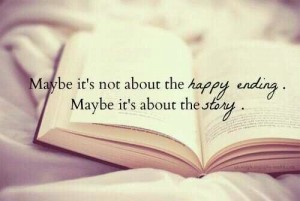
But today, I’d like to hear about the books my blog readers have read and loved. Or Authors. I especially like to find new authors. So, please, leave me a comment – tell me what your favorite book/author of all time is and also what is the most recent book you’ve read that you just loved and couldn’t stop raving about. I’m going to compile a list of all the new suggestions you ladies and gentlemen make and two of you will win a $10.00 GC to either Barnes & Noble or Amazon – your choice. Be sure to leave me info on how to reach you, preferably an email address, which you can send privately to me via skye@skye-writer.com
 
Saturday, May 23 2015
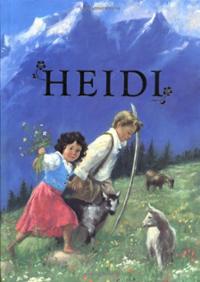 
Recently someone on FACEBOOK asked the question, ‘What was the first book you read and loved when you were a kid?’ My mom read to me when I was really small and I’m sure I had my favorites, but I don’t recall them. I remember sitting on my dad’s bench reading Mr. Popper’s Penguins to my dad who was building a small wooden sailboat when I was ten or so, but the one book that stood out most in my mind was Heidi by Johanna Spyri. I was totally in love with that book and at least half in love with Peter.
Looking back on it now, I realize that was the beginning of my love affair with romance. Even though it was a child’s story about an orphan, there was something appealing about her friendship with Peter, and in the sequels Peter and Heidi grew up, fell in love and married. My first romance for sure. I grew up as well and graduated to Georgette Heyer who wrote dozens of Regency romances and set the standard for all who followed her.
Since the days that Heyer kept me enthralled, romance has changed significantly. There are so many genres and sub-genres. Whatever catches your fancy: military heroes, cowboys, wealthy CEOs, vampires, time travel, suspense, mystery, historical, Regency, medieval, inspirational, sweet romance or hot and sexy there is a romance out there to please. The advent of e-books and then the explosion of self publishing has shattered the grip that the big NY publishing houses had on the romance genre and everyone is pushing the envelope. And I think there is a place for all of them.
Romance has also become more diverse and inclusive. When I was young and nearly innocent myself, all the heroines were just that – young and innocent. Now they are all ages, from young adult teenagers to college women, and career women, women who have been married and widowed or divorced, and even older with grown children. And the heroes who were once always older, wiser, wealthy and more worldly have become more diverse. They might be wealthy or they might be farmers, or carpenters or policemen. And both heroines and heroes have begun to represent all of America. Instead of always being white, they are men and women of all ethnicities, skin colors and faiths. That surely has to be a plus for everyone. America is strong because she is diverse and to represent that diversity in romance just makes our reading experience better.
  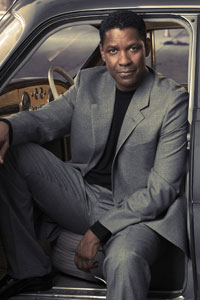
One of the biggest changes I’ve seen though is in the stereotypes. Heyer surely started the feisty heroine with a mind of her own trend and most readers of romance have little patience for heroines who simper and sigh and let the heroes make all the decisions. Heroines have become career women and soldiers, politicians and FBI Agents. A healthy reflection of the freedom that women have today to pursue their dreams independent of men. And our Heroes have changed as well. Once upon a time heroes were all stoic, strong, smart and capable. All of those characteristics are still part of our favorite heroes, but we’ve moved beyond that to accepting men who have been hurt and are struggling and sometimes even being willing to share their pain, especially with the heroine. Instead of standing, legs spread and arms folded across his manly chest on the rolling deck of his ship, untouched by the mayhem of a pirate’s life, he can be hurting inside because of the man he didn’t save, or the mother who turned her back on him. And even more recently we have navy SEALS, soldiers and Marines who can pull off the most amazing feats of heroism under fire and yet be gentle and loving and struggling with the things they’ve seen and done. Just as I loved Peter back when I was ten, I love these men who push themselves to the limit physically and mentally, who would move heaven and earth for the woman they love and are yet able to admit to the things that haunt them and reach out for help from those who care and be humble with their heroines. This softer side of today’s heroes makes them more complex, more complicated and more loveable.
  
The one thing that hasn’t changed is that romance is here to stay. More than any other genre in print or e-book, romance tops the list in sales and distribution. Love really does make the world go around, and I doubt we’ll ever get tired of reading happy endings.
 
Check out these other authors to see what they have to say about Romance today:
Beverley Bateman http://beverleybateman.blogspot.ca/
Fiona McGier http://www.fionamcgier.com/
Connie Vines http://connievines.blogspot.com/
Skye Taylor http://www.skye-writer.com/
Margaret Fieland http://www.margaretfieland.com/blog1/
Helena Fairfax http://helenafairfax.com/
Anne Stenhouse http://annestenhousenovelist.wordpress.com/
Marci Baun http://www.marcibaun.com/
Diane Bator http://dbator.blogspot.ca/
Rachael Kosinski http://rachaelkosinski.weebly.com/
Rhobin Courtright http://www.rhobinleecourtright.com/
Tuesday, May 19 2015
 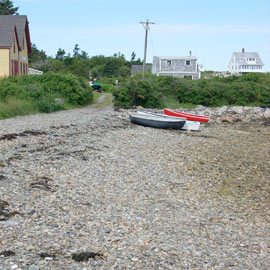 
High Tide at Noon, the first of the Tides trilogy by Elizabeth Ogilvie, was first published in 1944, long before I was born, but it was the first romance I ever read and I fell in love with Bennett’s Island and the people who lived there. Storm Tide was my favorite of the three and Ebbing Tide completed the story of Joanna Bennett and Nils Sorenson. I have hard cover copies printed on second rate paper during WWII and while I’ve considered purchasing newer editions, these hold a bit of nostalgia I’m not ready to abandon.
Ms. Ogilvie went on to write more than forty more novels, most set on the coast of Maine, many on Bennett’s Island. When I read her autobiography, I discovered that Bennett’s Island is a real place. An island at the very fringes of Penobscot Bay, Maine called Criehaven after the original family who settled it in the eighteen hundreds.
At the time, my dad had a small cruising sailboat and to my astonishment, he, too, had read the Bennett’s Island books. If you knew my dad, you would be astonished too. He’s not the romance type at all. But it wasn’t hard to convince him that we should sail out there one summer and explore the place. Once there was a bustling year-round community on Criehaven, or Ragged Island as it’s called on the charts. But in the mid fifties the price of lobsters plummeted and the draw of modern conveniences spelled the end of a way of life that had survived for over 150 years. For years the island lay forgotten, the solid old homestead perched on a ridge above the harbor sat empty along with all the other homes, the one-room schoolhouse, the store/post office and the club house.
Eventually the families who still owned those properties began to return in the summer months to fish the still teeming waters. The Krementz family (Of Krementz Jewelry) bought the homestead and restored it. The schoolhouse is now a cottage and the clubhouse a crumbling ruin, but many of the homes now hum with generators and electricity. The well still produces crystal clear, icy cold water that tastes like ambrosia. And the sea still beats an endless rote upon those granite shores, while men once again fish for lobsters within sight of that proud old homestead.
For me, it was love at first sight. As we rowed ashore to explore, we passed another small skiff headed back out to a quaint little boat rigged with a sail, a canvas tarp and a crooked little stovepipe. The man rowing looked as though he might have lived there a hundred years earlier. He called out a greeting and asked if we were headed up to Joannie’s place. Joanna Bennett being the heroine of Ms. Ogilvie’s books. Clearly we were not the only ones who’d read the stories and been drawn to come out and see this piece of paradise for ourselves.
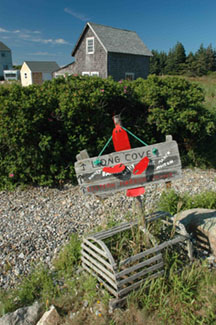 
We returned many times over the years my dad still owned a sailboat, and we always went ashore to explore. There was an ancient cemetery with gravestones dating back to the original Crie family. There were hushed forests of tall spruces, numerous coves and always the sound of the sea wherever we went. In the Tide books, the oldest brother had married beneath him according his family and moved in with his in-laws on the far end of the island so of course, we followed the old dirt road to see where Charles had lived. One night the sea was pounding against the seawall and even in the harbor the waves were big enough to roll us out of our berths so one of the lobstermen came out to invite us to spend the night in his daughter’s home because she was away and not using it. Turns out her place was the converted schoolhouse so I can even say I’ve slept on that island in a building that once saw children learning their numbers on blackboards. We always bought lobsters from the men whose graceful boats were anchored in Criehaven Harbor and I know they were the best lobsters I’ve ever eaten anywhere. Then we would turn in to sleep, rocked by the sea with the lullaby of the ocean in our ears.
 
The old Schoolhouse The Well
To say there is a lot of nostalgia for those days and that place would be an understatement. On one trip I found a gorgeous pink granite rock, made smooth by the crashing of waves on the shore. It was huge and I could just barely lift it, but I wanted that rock so I rowed down to the cove where I’d found it and wrestled it into the skiff and brought it back. It rode home on the floor of the cabin and lived for years by my back step in Maine. I even brought here to Florida with me where it still elicits compliments. I keep hoping that one day I will find a way to return. My dad is ninety-five and no longer owns a sailboat, but perhaps I’ll find a lobsterman to haul me and a couple weeks worth of food out there so I can revisit all my favorite places. Maybe I will some day. Or perhaps I won’t. But the memories will be with me forever.
 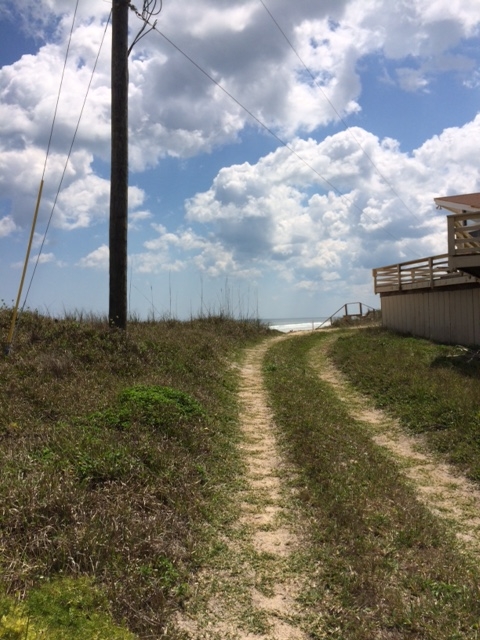
The road on Criehaven The road in Summerhaven
I have always loved the sea and am fortunate to live here on a barrier island in Florida where it’s considerably warmer than Penobscot Bay Maine. Nearly every day I go for a walk, usually along the edge of the water. But occasionally, I wander up into the dunes where I’ve found the remnants of a long ago road that winds down the middle of the sandy soil and lush vegetation. And when I do, I am always reminded of the road on Criehaven. There are no tall spruces and prickly pears grow instead of beach roses. But the sound of the sea is in my ears and the scent of the ocean all around me. And if I close my eyes I can almost imagine I am on Criehaven again.
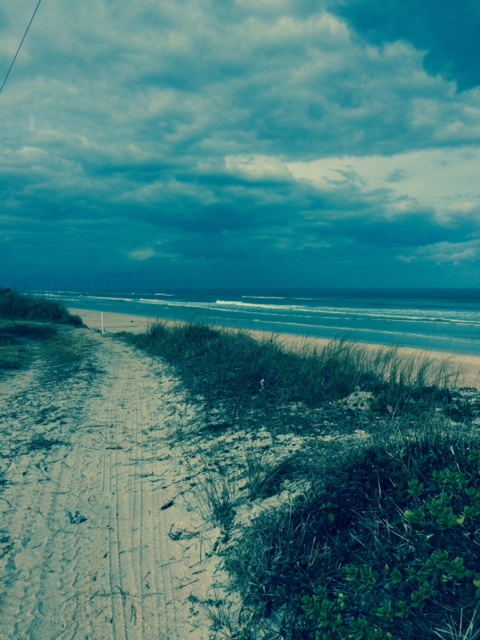  
The road through the dunes of Summerhaven, St Augustine, Florida
Monday, May 11 2015
In honor of Mother's Day . . .
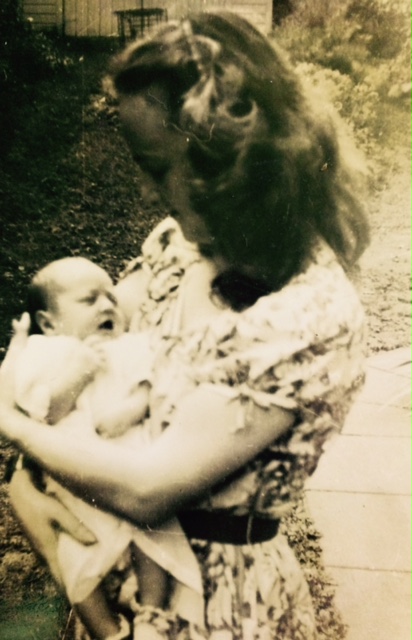 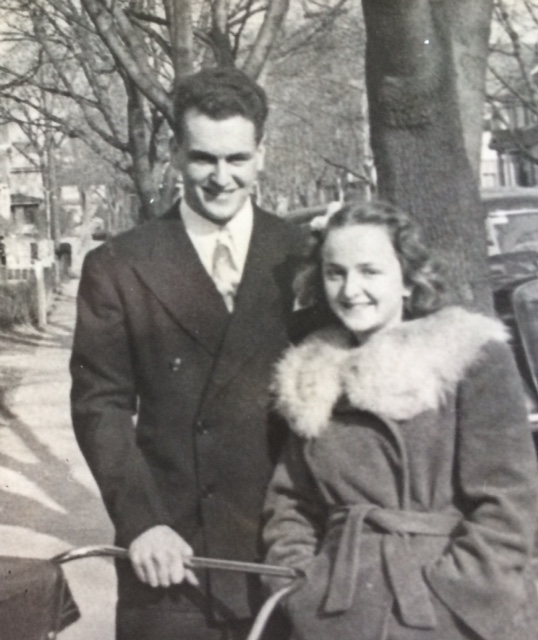
My mom was diagnosed with Alzheimer’s when she was seventy-seven, but even then we all wondered if she’d had it for a lot longer than we or the doctor knew. She’d been completely deaf since her late thirties and while she lip-read very well, she also got to be an expert at pretending she knew what strangers or casual acquaintances were saying even when she didn’t have a clue. In retrospect, we began to realize that she’d been faking it with us as her memory began to fail.
She never seemed frustrated by her loss of memory. In fact, it was the rest of us who were frustrated and she always responded with a big smile that defused our exasperation.
Even before she went into assisted living care, she began to be foggy about who I was. One night when she asked, and I told her, she didn’t believe me. So I hauled out my driver’s license thinking to prove I was who I claimed to be and her shocked reaction was to ask why I was in possession of my sister’s driver’s license. Even she laughed about it two nights later when she did remember who I was. Conversing with a deaf person who can’t recall how the sentence began has moments of humor, but it’s mostly frustrating and increasingly sad. A few things she never forgot – like the fact that it was me who took her car away. Until nearly the end of her life, she held that indignity against me. And she never forgot that her Johnny was the love of her life.
One thing I remember most about her last few years was that in spite of not being sure who I was, she still loved me and it showed. Until she went into care, she lived next door and I always stopped by on my way home from work. She always lit up with welcome and opened her arms for a hug when I walked into her living room. I “talked” to her mostly through written notes on her multitude of notebooks which had the advantage of being able to flip back a page or two when she continued to repeat the same questions. But the visits were always good ones because I knew she enjoyed our moments together even if she remembered nothing of them as soon as I disappeared from sight.

When the call that I’d been dreading for some time came, I rushed to her side at the hospital where her labored breathing was the only sound in the room. Her heart had failed and although the EMTs had gotten it started again, she never did regain consciousness. When her last breath came, my sister was with us and we were talking on the phone with my brother who lived several states away. So we were all together, hanging on to each other and our memories of a mother who had always loved us with her whole heart. I will always remember the stillness and love that filled that room at that moment. But even more, I will always remember the thousand-watt smile that greeted me every time I went to visit her, even long after she’d completely forgotten either my name or my place in her life. Sometimes a mother’s love is felt more than spoken, and ultimately it transcends even death. I see her smile in billowing white clouds against a brilliant blue sky and a dozen other things she loved, and I feel her touch in the soft darkness as I fall asleep each night.
Happy Mother’s Day, Mom. You were and are the best.

Tuesday, May 05 2015

No – not physical babies, but still . . . Every author has been there. You’ve spent hours and hours plotting and writing your story. You have fallen in love with your protagonist and you’re rooting for them to succeed. And, of course, since you’re the author who created them, you can make sure they do. You’re pretty impressed with yourself, for the quicksand you tossed your characters into and the unexpected ways you threw them a line and hauled them out of trouble. It’s your baby and it’s your best work yet.
So, with a smile on your face, you send it off to your trusted critique partners and a beta reader or two. While you wait for them to get back to you, you’re doing your best to focus on a new set of characters with new complications to overcome, but you’re still anxiously awaiting word. You want to hear how wonderfully you’ve woven your story and how terrific your beta readers felt it was. Phrases like “I couldn’t put it down,” or “your love scenes were perfect,” or I never saw that ending coming,” would fill you with a sense of accomplishment and pleasure.
But what if the reports are less glowing? What if one of your beta readers does love your characters and thought the love scenes were hot enough to make them need a cold shower, but….. Always a but. What if they also saw a huge plot hole? What if one of your characters was so totally out of character that they just couldn’t care what happened to them? Or what if the plot and the characters were great, but they found a lot of “stuff” you didn’t really need? Cliché and redundancy.
You could, like some authors who don’t react well to honest critique, or others who decide that they ultimately knew best in spite of a fair consensus to the contrary, go ahead and either publish your work as is, or send off to an agent or editor convinced it will be the best submission they’ll get all year.

Or, you could go back and edit your work, keeping in mind the honest comments your “trusted” readers made. That’s when killing your babies comes into play. If you fix a major plot hole, you might discover that some of the scenes you were the most enamored of are no longer relevant. Places you spent a lot of time getting just the right words to create the perfect picture have to go. You are in love with those words. But if your readers are right, you’ve got to cut them out. It hurts. It’s so hard to let go of those perfect scenes and flowery phrases that didn’t captivate the reader nearly as much as they did you. That’s ‘tough love’ for an author.
As I evolved as an author and began to take such critiques seriously, I still wanted to “save” my best babies so I created a file where I could preserve them. Perhaps I’d find another scene where they would work, or another book maybe. But as it turns out, there are quite a few files on my computer filled with my hopeful saves. When I took the advice offered, more often than not, I discovered my plot was better and stronger without them. And my characters were just as vibrant and loveable.
Just as it was when I was raising my kids, when tough love was hard to dish out, and I steeled myself to do what had to be done and my children grew stronger for it, so it is with my books. 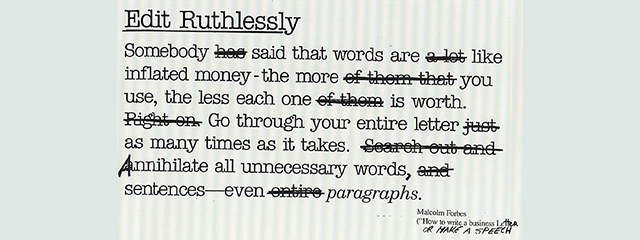
Monday, April 27 2015

You’ve poured your heart and soul into a book or a story. You’ve edited and polished. Now, you’re ready to share it with your critique partners. If you have a good relationship with your critique partners, they will tell you what didn’t work for them and what did. They’ll tell you your characters leapt off the page and into their hearts, or maybe they felt the heroine was too wishy-washy and the hero too arrogant. They liked your story and can’t wait to find out what happens next. Or maybe they didn’t get the point. What do you do when their comments don’t echo the love you felt when you sent them your pages?
If you want to be a good writer, a better writer, or an excellent writer, you listen to their comments with an open mind.

After careful review, you might decide that you know your heroine better than they do and she has to come across like this for now, or your hero is heading for a fall and his arrogance is going to drive the conflict. But is it possibly you left out something important from their backstory? Something you know inside and out, but your reader hasn’t got a clue to? Not that I’m advocating an information dump, but perhaps you need to revisit your pages and see where hints of their pasts could be inserted to give the reader a reason to love them in spite of their tentativeness or arrogance. Just maybe the reason your critiquers didn’t get the point was because you thought withholding some critical piece of information would make for a nice surprise later on in the book, but on careful reflection they had a point. They needed to know that bit in order to get why the hero or heroine was even doing this or that now. And trust me, your critique partners are only the first people who are reading your work. Next comes your editor who’s likely to be just as discerning and then your readers who won’t hesitate to shoot you down if you leave them hanging when they expected better of you.
If your crit partner or reader suggests that you should have started somewhere else, listen to them. Maybe you should have. We’ve all heard the lessons on the “HOOK.” The hook in the back cover blurb, the hook in the tag line, the hook at the end of the first page and again at the end of the first chapter. Once you’ve convinced a reader to pick up your book, you don’t want to give them any reason to put it down again until they’ve turned the last page and sighed with pleasure because the story was so awesome or groaned in anguish because there is no more. Some of my favorite books and I’m sure yours as well, were written some time ago, before this world of instant everything from coffee to news cycles to Skype and text messaging. If you revisit those books, how many of them take entire chapters or narrative and description before the action begins. If they were being written today they’d never make it into print because the reader would give up long before they got to the action. We read them over again because we already know we love the characters and the story, but we might be skimming over that boring beginning. So if someone tells you that you began your story in the wrong place, it’s worth taking seriously.

In the end, the story is yours. The voice is yours and the characters came to be in your imagination. You need to be true to all three, but the importance of keeping an open mind about negative critique can’t be overstated. Consider the comments objectively and then revisit your pages. Sometimes I’ve changed something I thought was great just the way I’d written it, but because my critiquers had brought it up, I tried rewriting it with the change they suggested and discovered that my story was stronger and better than before. Sometimes it’s a case of not being able to see the forest for the trees. We are so close to our characters and their struggles, we fail to see what is obvious to anyone looking in from the outside. Other times you will decide it really is just fine and better the way it is, and you won’t change it. But being open to critique will always make you a better writer.
And what about those negative reviews? Sometimes they are frivolous, sometimes totally off the wall. A reader loves sweet romance and they pick up erotica because they liked the cover maybe. It’s not the author’s fault they didn’t like the sex. In another book a reader felt the language was coarse and the carnage too graphic, so why did they choose to buy a book written by a soldier about the war that gives him nightmares? Those reviews can be dismissed. Yeah, they hurt, but they don’t count. But if several reviewers all found the same problem, maybe it is worth considering. Unless you are self-published and can fix and repost the book, it’s too late to change this book, but the critique can be considered for all future books.
Not everyone is going to love your work, just as you aren’t going to like everything else that’s out there to read, but any critique or review might contain a nugget of wisdom that will help you grow as a writer. Instead of letting a bad review ruin your whole day or your whole week, consider it an opportunity to be better than you already are.
Saturday, April 18 2015

What keeps me glued to a story start to finish? Characters I care about. It’s totally about characters, whether it’s a romance, a thriller or women’s fiction. If I can’t care about the characters, then why on earth would I care about what happens to them?
In a romance, I want a hero I can fall in love with and I want a heroine who is strong, resourceful and generous who can laugh at herself. In a mainstream, thriller, intrigue or drama, I want a protagonist who is portrayed as someone I’d like to have as a friend. Heroes and heroines don’t have to be perfect, gorgeous, young, wealthy or powerful. They should be flawed, but aware of their failings and trying to be better people. I am especially drawn to heroes who have been hurt and have found or are finding the courage to overcome the things that have broken their hearts and spirits.
When an author lets me into the heart and soul of his or her characters early in the story that makes me stay with the story when things begin to fall apart. Think about some of the events one reads about in the paper, or sees on the eleven o’clock news. A child has been abducted, a family was seriously injured in an auto accident, a policeman was ambushed and killed in a big city, or a volunteer fireman was crushed by falling timbers in a raging fire while he was trying to rescue a trapped old man. All of these events are the things we feel sorry about, but how many of them do we remember a few days later?

But consider Jeff Bauman and Carlos Arredondo whose faces captured the world’s attention the day after the Boston Marathon bombing. Arredondo in a cowboy hat doing his best to staunch blood from Bauman’s shattered legs was caught on camera and immediately they became the face of that horrific event. For some, perhaps many, that picture and the momentary thoughts they gave to the two men were the end of the story. But then we got to know more about them. We found out that Carlos Arredondo had lost a son in Iraq and was still suffering from that heartbreak when he launched himself into the middle of the chaos to save Jeff Bauman’s life. In the days and weeks that followed we began to see the depths of courage Jeff Bauman exhibited as he came to terms with the loss of his legs. As the personalities of these two men and their stories were revealed, we became engrossed in them and we began to pray for them and hope for the best. We wanted them both to become triumphant over the evil that had befallen them. They were no longer strangers we cared about only in passing.
That’s what an author has to do to keep me riveted to a story. They have to reveal the heartbreaks, the pain, the goodness, the courage, the generosity of their characters and make me care. Then I can’t put the book down because I simply have to know what happens to these people I’ve come to love. I enjoy a good thriller and Lee Child’s Jack Reacher stories are at the top of my list of favorites, but it’s not because Child fills his books with action or endows Reacher with incredible fighting skills. It’s because he makes me care about Jack Reacher as a person. A man with a past and a present I might not fully understand, but yet, a man I can care about. He’s had his losses and heartbreaks, he’s been places and seen things that have done their best to break his spirit, but he’s remained an honorable man in spite of them and he’s always setting aside his own life to help others. That’s what keeps me glued to Jack Reacher stories. It’s the same with David Baldacci’s Oliver Stone. Oliver Stone is a very different character from Jack Reacher and his past is revealed bit by bit over the course of several books, but in the beginning, in the very first book of the series, in the first couple chapters Baldacci made me care about Oliver by showing me the caliber of the man Oliver is and hinting at the suffering and loss in his past. Whatever the current intrigue or conflict, I am cheering for Oliver Stone and his odd collection of friends because the author created characters I could care about and become totally engrossed in.

When it comes to romance, I almost never read about rich and powerful men. I’m more taken with men who’ve made something of themselves without wealth and family influence. A soldier, a cowboy, a man who builds houses – their status means little, it’s their personality that counts for me. Men who can be strong when they have to, yet have their weaknesses. Men who aren't afraid to show their feelings and men who put the ones they love above themselves. The same goes for my heroines. There are very few women in this world blessed with stunning beauty, so I’d rather read about real women. Strong, capable, amusing, intelligent and loving. It’s not her beauty that makes Cinderella a character the world is forever in love with, it’s the struggles she faces and her cheerful resilience in the face of adversity. It was not Johnny Castle’s charm and good looks that won the hearts of women in Dirty Dancing, it was his humility, his humanity and caring more about Frances "Baby" Hauseman than himself. And it wasn’t Julia Robert’s beauty that made me care about Vivian Ward in Pretty Woman, it was the strength of her character, her determination to be someone in spite of her background and her willingness to teach a man who knew little of love what loving was meant to be even if it broke her heart.
 
So, for me, it’s all about the characters. Whatever the genre, if I don’t come to care for the characters early on in the book, it matters little how gorgeous the scenery, or how dire the circumstances, I’m probably not going to finish the book. And the books that stick with me long after I’ve closed the covers and put them back on the shelf are the books peopled by unforgettable characters I fell in love with and couldn’t turn my back on.
What keeps you glued to a story? Don't hesitate to leave a comment below. And in the mean time, why not check out some of these other authors and see what keeps them turning pages.
Beverley Bateman http://beverleybateman.blogspot.ca/
Diane Bator http://dbator.blogspot.ca/q
Ginger Simpson http://mizging@blogspot.com
Skye Taylor http://www.skye-writer.com/
Marci Baun http://www.marcibaun.com/
Margaret Fieland http://www.margaretfieland.com/blog1/
Helena Fairfax http://helenafairfax.com/
Anne Stenhouse http://annestenhousenovelist.wordpress.com/
Fiona McGier http://www.fionamcgier.com/
Connie Vines http://connievines.blogspot.com/
Rachael Kosnski http://rachaelkosinski.weebly.com/
Victoria Chatham http://victoriachatham.webs.com/
Lynn Crain http://www.awriterinvienna.blogspot.com
Rhobin Courtright http://www.rhobinleecourtright.com/
Tuesday, April 14 2015
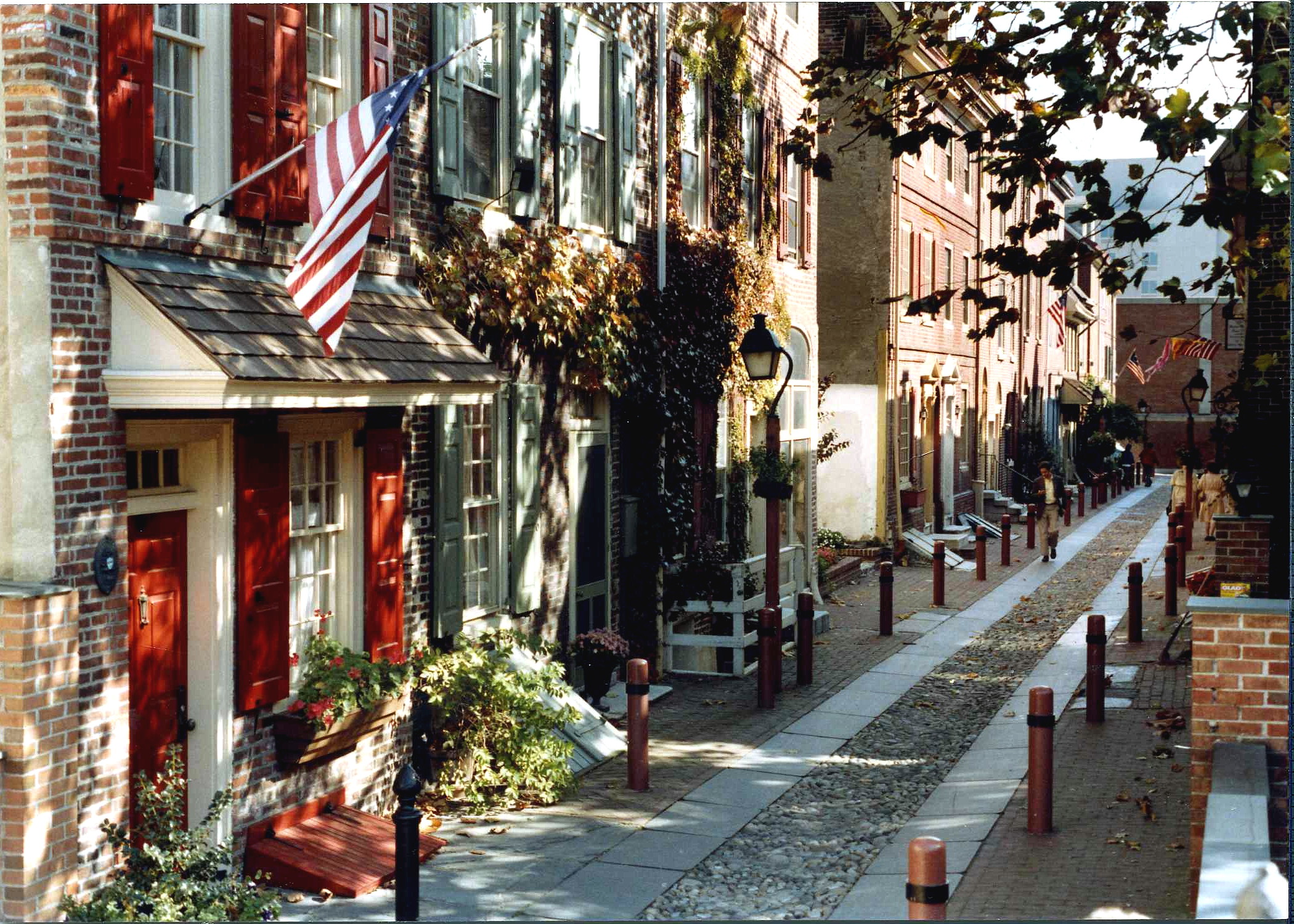  
Readers often ask writers where do you get your ideas? Writers ask each other the same thing sometimes. The answer can be as simple as I went for a walk, or it could be far harder to explain. Ideas come from many places and are fed by brainstorming with yourself or others. For me, it's mostly about creating complex characters and then putting them in a difficult situation to see what they will do. For those who write thrillers or who-done-its the front page of the daily paper is teeming with possibilities. Seems like there are crazy things happening all around us every day. And I dare anyone with an imagination to visit a historical site of any type and not find lots of ideas lurking in the ancient walls and pathways.
My first book in print was a mainstream novel about three men in a tight race for the White House. I once flippantly replied to the query what made me write it that I didn’t like any of the choices I’d had for most of my adult life and decided to create my own candidates. In a way, that was partially true once I got to creating the characters, but mostly it was one man’s personal journey. My protagonist was in a close, three-way campaign for president when he was confronted with a personal crisis during the last critical weeks. I got my ideas from a number of places, some of them real life stories. Here, newspaper stories about different people experiencing different life events and how those impacted their public life provided leaping off places. My imagination did the rest.

I also enjoy historicals. Partly because I enjoy history and partly because I like to imagine living in a different era, a past very unlike where I exist. Ideas for stories seem to leap out at me when I visit old sites. One book, not yet in print but hopefully one of these days, starts out on an island off the coast of Maine. I sailed there with my daughter and my dad one glorious summer day. The island was once a busy community of farmers and fishermen, but today it’s deserted with just old cellar holes to mark where the houses once stood. I’d read some of the history of the island before I sailed out there and knew there had been a bustling trading center at the time of the Revolutionary War. So, as I stood on the edge of one of those empty fieldstone foundations gazing back towards the brilliant blue harbor, one of the stones beneath my feet wobbled. Then came the random thought: What if I fell into that old cellar, hit my head and was knocked unconscious? And what if when I woke up, there was a roof over my head? So that’s exactly what happened to my heroine. I had a grand time writing that story.
Old deserted buildings of all kinds provoke questions about who lived there once and what their lives might have been like. Castles and churches, old taverns and narrow twisting alleys lined with homes built hundreds of years ago. Maybe it’s just my busy imagination, or maybe it’s the ghosts of those people who once lived there urging me to tell their stories. A visit to the Boston Tea Party museum and a meeting with Samuel Adams, or a saunter around Mount Vernon and a chat with George Washington’s body servant make the men and women we met in the history books back when we were in school come alive. Suddenly their everyday lives inspire me with stories of others who might have lived back then, in those same places, experiencing those same events.
 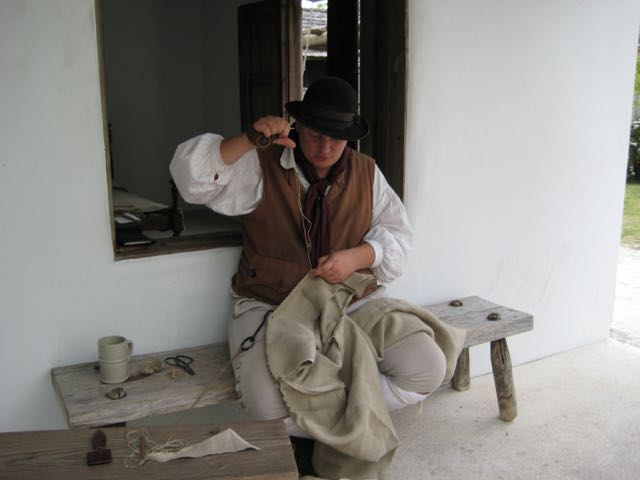 
I’m currently writing a contemporary romance series about a family living in a town I created on the coast of North Carolina. I can’t say for sure where Jake first came from, but he grew out of the aspects that I find intriguing about the heroes I’ve read and been touched by, both fictional and real. And the more I knew about him, the more I discovered about the kind of heroine he’d be likely to fall in love with. Then it was just a matter of putting them together with a mountain of conflict to overcome. So, I guess it all just boils down to asking yourself, "What if?" And letting your imagination take flight.

Tuesday, April 07 2015
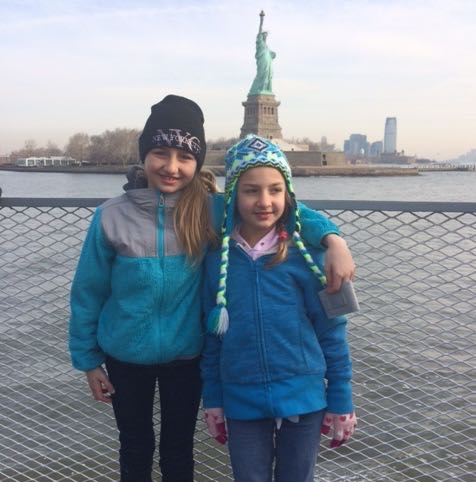 
My campaign to instill an interest in history in my grandchildren added a new chapter yesterday. Theresa, Lynn and I took a ferry out to visit Lady Liberty and Ellis Island. Before our trip Theresa (almost 10) read a novel about a boy who went on a field trip to Ellis Island and ended up meeting his own ancestor when he traveled back in time. Lynn (a first grader) devoured a book loaded with facts about the Ellis Island immigration center, and I found it amazing the amount of facts she soaked up and shared when we were there.
We would have liked to possess tickets to climb up inside the newly renovated Lady Liberty, but those were sold out until June. Perhaps I’ll have to come back and we can go again. Instead, we scooped up the recorded guides and setout to learn about this magnificent gift from the People of France that represents what America is all about for the millions of immigrants who gave up everything they once knew to come to America. Both girls were amazed to learn that in 1886 when Liberty Enlightening the World was first erected, she was the tallest thing in New York City. For kids born in an era of 100-story skyscrapers trying to wrap their minds around the fact that the tallest buildings in NYC were only five stories tall, but Lady Liberty was 22 stories tall was quite a stretch. How much more impressive this incredible statue must have been then! Theresa was pretty taken with the fact that even her fingernails are as long as an adult’s forearm.
Although I’d been out to visit this National Monument before, even I learned a few new things – most striking – around her feet are chains and a broken shackle that represent freedom and that her tablet is inscribed with the date of our own declaration of independence, July 4th 1776.
 The great Hall where immigrants were processed. The great Hall where immigrants were processed.
Then it was back to the ferry for Ellis Island where we took a ranger guided tour, and Lynn shared more of the interesting facts she remembered from her book. She told us that immigrants were asked if they had the $25 required (as proof of self-sustainability,) but some lied as they had no money at all. Medical exams were brief and if you had any number of ailments, they would write a letter on your jacket in chalk. Certain nationalities were required to turn their jackets inside out and women were lot allowed to immigrate unless they had a husband with them or waiting for them. But even more impressive than the little details were the bigger figures.
From 1892 when the federal government took over restricting who could and could not immigrate into America until 1954 when the facility on Ellis Island was closed, over 12 million people came to our shores via this entry point and on their busiest day, April 17th 1907, officials processed 11,747 individuals. It is said that over 40% of Americans today can trace at least one ancestor back to Ellis Island.
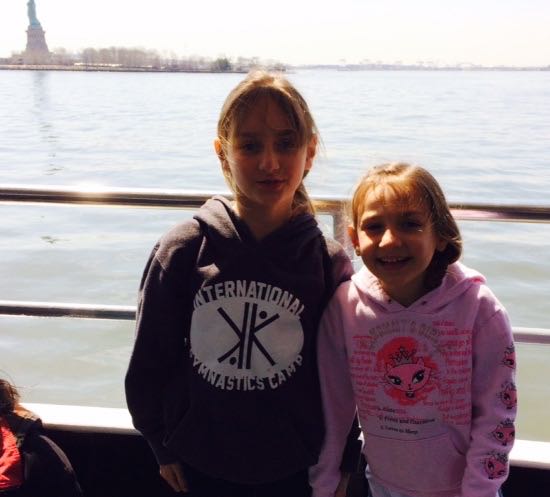 
Another ferry ride took us back to Manhattan. On landing we stopped to watch a talented group of brothers demonstrate some fantastic break dancing moves before heading north to visit the 9/11 World Trade Center memorial. For the girls, the square water pools that delineate where the buildings once stood were fun to check out, but having been born since that day, they are too young to feel the gut-deep horror of what that day must have been like for those who were there when the planes flew into the towers or the powerful emotions that fill the hearts of everyone else who remembers with sharp poignancy where they were and what they were doing with they first heard the news.
I’m not sure where our next history adventure will take us, but this bright spring day taught all three of us a few new things about what a blessing it is to be an American.
Tuesday, March 31 2015
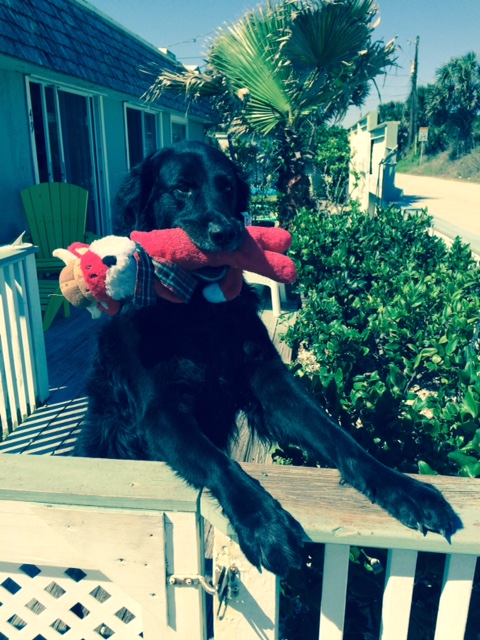 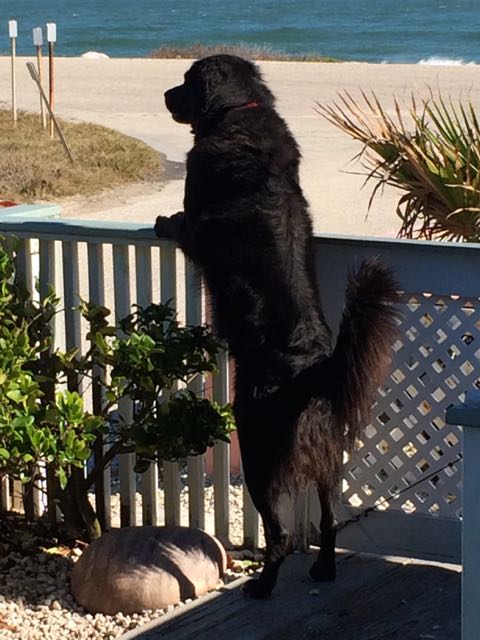
While I won’t deny that I really would enjoy having a significant other around who stands on two feet and doesn’t leave clouds of hair everywhere, I am fortunate to have Mr. Sociable sharing my life. He wears a fur coat year round, gives sloppy kisses and has put himself in charge of my at-home social life.
We live on a corner, and because the beach is just a few yards away, lots of folk pass by our deck
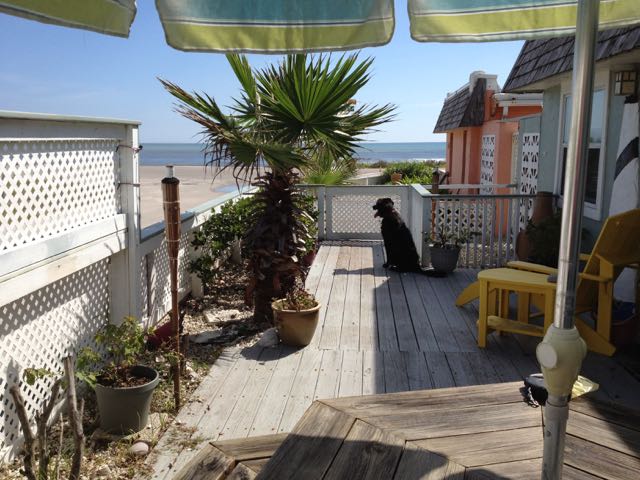 
on their way to the water. And MacDuff, who loves people and thoroughly enjoys saying hello to everyone is in his element. He barks to tell me when another dog is passing by and if there wasn’t a fence around the yard, he’d be right out there to greet them all with a thorough sniff and a wag or two. But when human friends happen by he immediately hunts for one of his toys, which he must have in his mouth before he can greet anyone of importance who stops to say hi.
At first this was just his thing. If he was inside, he'd sit looking out making urgent wuffing sounds to be let out. And if he was already out, he'd stand under the window in front of my desk muttering the same urgent summons to tell me he must come in to get a toy. So, I get up to let him in, he dashes to his toy basket, chooses the first one he sees and hustles back out to greet whatever friend is waiting for him. But somewhere along the line, just getting his toy wasn’t enough. He decided that I needed to be included in the social encounter so I wouldn’t miss all the fun. If I ever had an inclination to be a hermit, I’d have to rehome the mutt because he’s quite insistent that I talk to every friend we have, every time they show up. Which in a couple cases is more than once a day.
 
I have to admit, the interruptions are a good thing. At first, when he came in to repeatedly nudge my hand making it impossible to continue typing, I was reluctant to leave my story lest I lose my train of thought. But I’ve come to enjoy my several times daily visits over the fence, chatting about everything from the weather to grandkids to great books we are reading and any other topic of the day. Once MacDuff has ensured that I am out and engaged and he’s gotten his ears scratched, Mr. Sociable goes to lay down, satisfied that he’s done his job.
I live alone, but thanks to MacDuff, I am never really alone. Writing is a lonely pursuit, but MacDuff sees to it that I don’t take that too far. As I finished typing this blog post, I looked up and there he was, sitting under my window looking at me. There was no one outside to visit at the moment. He just wanted me to come out to toss his toy and play keep-away for a bit. He wouldn’t mind a few pats while I’m there either, and I get off my duff to enjoy a few moments in the fresh air and sunshine. What more could one want?
 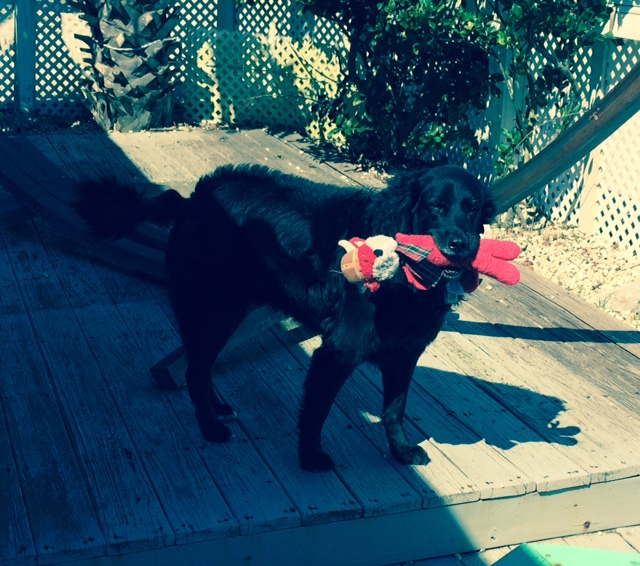
|